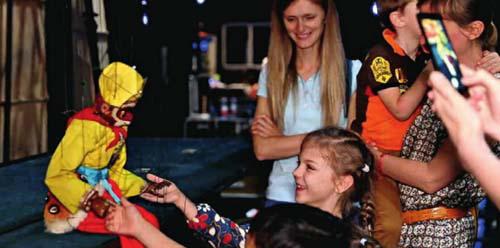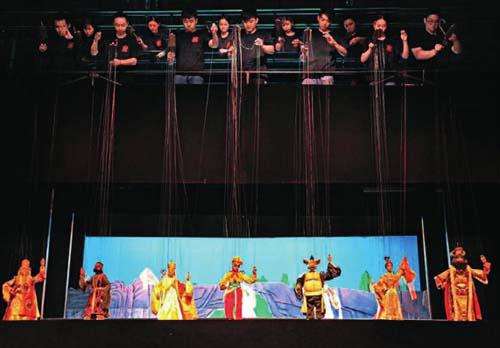Millennia Old Art Meets Millennials
By staff reporter ZHOU LIN
THIS May, the Beijing Tianqiao Performing Arts Center and the China Puppet Thea-ter were full of spectators, who enjoyed The Flaming Mountain of the Quanzhou Puppetry Troupe. Among the audience, a dozen of foreign diplomats attending with their families heaped praise on the Chinese traditional performance art and its glorious achievements.
2,000-Year Dramatic Art
Quanzhou marionette art, originated in the Qin(221-206 BC) and Han (206 BC-AD 220) dynasties and became popular in Quanzhou area in the late Tang Dynasty (618-907) and Five Dynasties (907-960).
Established in 1952, Quanzhou Marionette Art Inheritance and Protection Center, or the Quanzhou Puppetry Troupe, is commissioned to carry on this national intangible cultural heritage. The troupe now maintains more than 700 traditional puppet shows and a unique type of operatic music named“Puppet Tune” consisting of over 300 compositions. It has also formulated a series of marionette stringpulling skills and unique techniques for puppet sculpting and design.
The Flaming Mountain is adapted from the classic Chinese fantasy novel Journey to the West. Monk Tang Seng and his disciples are stopped by a flam-ing mountain on their way to the west. The story is about how the Monkey King fought with the Princess of Iron Fan and eventually borrowed the Plantain Fan to put out the flame. Performed on the “Over-bridge Stage” invented by the troupe, this show combines marionettes, rod puppets, hand puppets and human performance all together, which requires high skills.
Marionette performance requires multiple techniques, for example, when the Monkey King disguises himself as a fly in tea cup and is dumped into the Princess of Iron Fans stomach, performers need to attract the audiences attention to the tea drinking process; when the Monkey King is fighting with the King Bull, his hands should ward off the counterparts weapon, performers have to control the body and arms of the character to keep this gesture through long strings from the over-bridge stage above; when the Monkey King is walking, his feet need to be parallel with the ground; and when rod puppets are performing on the stage, actors should avoid any exposure of their bodies behind the curtains.
As a dramatic art with a history of over 2,000 years, marionette performance had been popular in Chinese peoples life before the birth of human performed opera. Nowadays, childrens drama has become dominant for marionette shows, which, to some extent, dilutes the expressiveness of this art. Therefore, the innovative attempt of the Quanzhou Puppetry Troupe has given this ancient performing art a chance to display its artistic vitality and creativity in a pluralistic way.
Wang Kui, director of the Theater Research Institute of Chinese National Academy of Arts, remarked after watching the show that Quanzhou Puppetry Troupe not only preserves the 700-plus traditional theatrical pieces sung in “Puppet Tune,” but also creates some excellent new programs. Outstanding artists like Huang Yique have raised this traditional opera to new heights, fully representing its vitality in the new era.
Inheritance and Innovation
Created in 1978, The Flaming Mountain was awarded the First Prize for Performance in the Celebration of the 30th National Day of the Peoples Republic of China in 1979. In 2009, it got the Outstanding Repertoire Award. It has now been performed for 4,000 times.
“Inheritance is not everything; we also made some innovations in it.” Deputy director of Quanzhou Puppetry Troupe Xia Rongfeng told the reporter, “There are three generations of performers in the troupe. On the basis of maintaining marionettes artistic expression we combine marionettes, rod puppets, hand puppets and human performance all together, which expands the ways of stage performing arts and presents the artistic achievement of contemporary marionette shows.”
The major aim of performing this ancient show is to cultivate a new generation of performers. As The Flaming Mountain was created in the 1970s, senior performers have all retired or passed away; when the play was re-performed in 2016, recordings by the old generation were still used. Starting from 2017, the post-90s performers were required to sing and act by themselves. Pressure pushed them to grow up quickly and in a comprehensive way.
“Letting young actors speak and sing by themselves helps them grow rapidly. When we made recordings for them this year, they had already made great improvements. Each performance is an oppor-tunity for the new generation to practice and grow. We hope they can introduce Chinese marionette art to the world.” Head of the Quanzhou Puppetry Troupe Hong Shijian expressed his wish.
Post-90s Zhang Yaohua is a third-generation performer of Monkey King. He feels great pressure since his character needs to jump up and down and perform very flexible movements, which need a great deal of practice. However, after a period of perseverance and learning from the older generation, the young performers devotion has reaped fruitful outcomes.
Lin Lin, an official with the Art Department of the Ministry of Culture, heaping praise, said, “The retrofit of The Flaming Mountain by Quanzhou Puppetry Troupe has added some innovative ideas which make those characters more vivid. I feel so proud of our young generation of performers. ”
In 2012 the strategy for training coming generations of Fujian puppetry practitioners was enlisted on the register of good safeguarding practices of intangible cultural heritage by United Nations Educational Scientific and Cultural Organization.
Art Is a Universal Language
Hong Shijian shared his feelings about the performances, “Our team dispatched 27 members to Beijing this time; most of them are post-90s youngsters who, for the first time, walked out of Quanzhou and stood on the stage of Beijing. The successful performance bears witness to the achievements of our talents cultivation. We are proud of receiving affirmation from so many diplomats.”
The Ambassador of Lithuania to China Ina Marciulionyte told the reporter, “Art is a universal language.” This classic repertoire born in 1979 has been perfectly presented by a group of post-90s performers, and everyone, from kids to adults, loves watching it. Western and Eastern arts and cultures are easily exchanged on the fingertips of young Chinese artists.
David Bartosch is a German professor with the School of International Relations and Diplomacy in Beijing Foreign Studies University. He came with his family, “All children love puppet shows; in Germany, kids often watch them. If I had not been in China, I would have never known that Chinese marionette has so many performance skills and techniques that are far better than European marionette. The gorgeous performance, especially seeing those puppets, large or small, I had to say that Chinese marionette is top class. If it is possible, we hope to promote the exchanges of Chinese and German puppet performances, which must be a meaningful and pleasing fusion!”
Hong Shijian told China Today, since its establishment more than 60 years ago, the troupe has produced and performed plenty of excellent puppet shows. The troupe has made 150-plus tour performances around China and toured over 50 countries and regions worldwide. It received the Peoples Friendship Award issued by Chinese Peoples Association for Friendship with Foreign Countries. It has been invited for performances at the UN Headquarters and the UNESCO headquarters, at the opening ceremony of Beijing Olympic Games, in Carnegie Hall of the United States and National Theater in Brussels, Belgium, as well as in the Great Hall of the People in Beijing.

